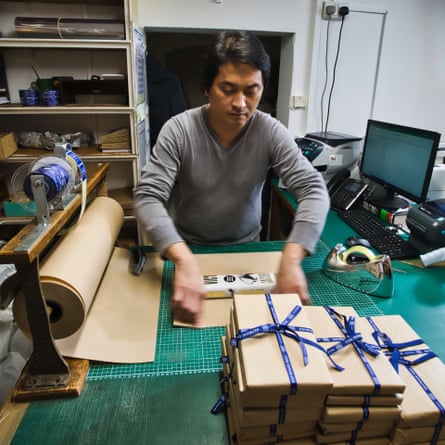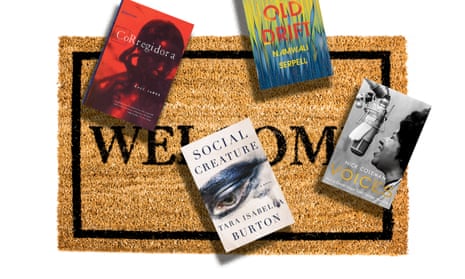Heywood Hill bookshop has stood on the same street since 1936. It inhabits a Georgian townhouse at 10 Curzon Street in Mayfair, London, a blue plaque outside commemorating its most famous employee, Nancy Mitford. Behind its heavy wooden door, a customer explains that she is visiting the UK from Australia, and would like to speak to someone about the shop’s subscription service. The word has clearly travelled far.
From chocolate to coffee to beer to grooming products, subscription boxes are big business, and books are no exception. There are countless online companies that ship out a monthly read, some adding artisan teas, hot chocolate, or an adaptation on DVD of the book. But Heywood Hill’s subscription is as bespoke as possible: each package is individually tailored to the reader’s tastes following a conversation between the subscriber and a bookseller. Camille Van de Velde, one of Heywood Hill’s five subscription booksellers, takes me down a rickety staircase into the basement from where the scheme is run. Staff are at work in a series of pokey interlocking rooms, stacking titles on shelves, ready to be wrapped, packed and shipped. They won’t be specific about numbers, but each has hundreds of people to choose for each month, and it has, by all accounts, transformed the business.

Subscriptions range from £125 for six paperbacks to £1,150 for 40 hardbacks, which means this is not the cheapest way to buy books. But it is a distinctly human transaction in a world that is increasingly automated: using your own knowledge to curate to someone else’s taste goes against the algorithmic approach. As I watch them pile up the shelves, book by book, a name on a paper insert in each one, I keep thinking of an exchange in Ali Smith’s Spring, when Richard asks his friend Paddy how she knows “everything about everything”. “I’m a dying species,” she replies. “I’m that thing nobody out there thinks is relevant any more. Books. Knowledge. Years of reading. All of which means? I know stuff.” The libraries these booksellers carry around in their brains are astonishing. You can practically see the flicker of their mental index cards whirring as they decide what might delight a particular customer. They all have their favourites, they admit, and sometimes end up corresponding with them for years.
Mr B’s, an independent bookshop in Bath, has been offering its own bespoke subscription service since 2012. It grew out of an idea called a “reading spa”, an in-store chat about books, over tea and cake, that would conclude with a list of tailored recommendations. Nic Bottomley, who opened Mr B’s with his wife Juliette in 2006, explains that a subscription service was the logical next step. It meant they could reach customers who didn’t live in the city. “Our whole ethos is based around opinions and recommendations. The shop floor is a very lively and vocal place.” Bespoke subscriptions are an extension of that interaction. While they tend to match subscribers to booksellers with similar areas of interest, he says, there is still a bit of an art to it. “Sometimes you take people on little side loops, to the edges of their reading tastes, when you get a hunch that they are going to like a certain book. It’s great when it pays off.” It is paying off in more ways than one: they now send out thousands of books every month.

At Heywood Hill, the reading consultation can be either online, on the phone, or in person, which is why I am here today. I am a regular reader, but I feel stuck in a rut. I tend to go for whatever has been critically lauded, or an eye-catching classic from the charity shop. I rarely read nonfiction. I hardly ever read any genre fiction. I know what I like, but I feel as if I read what is around, lazily, and I don’t feel surprised any more. What can they do for me?
Eleanor Franzen, the bookseller assigned to my case, sits down opposite me wielding a notebook. “You look like you’re bracing,” she says, and she’s right. I have unwittingly pulled my shoulders up, and gritted my teeth, as if waiting for the dentist. I had been looking forward to this, but suddenly I realise just how intimate a simple question like “What is your favourite book?” can be, particularly when asked by a stranger. “Don’t worry,” she says, adding, with a doctorly flourish, “Everything you tell me, I’ve heard a worse version of it.”
Each question leads off into a chain of tangents, from birds to music to ghost stories to hobbies. Franzen takes notes. Do I read any crime? I don’t, but I tell her that I picked up a pile of Patricia Highsmiths in a charity shop last year, mostly because of their brilliant 1980s photographic covers, and loved them. She suggests Social Creature by Tara Isabella Burton, “which has a Ripley vibe. It’s also brilliant on being young, and poor, and on your own in the city, and knowing that if your gamble at a career doesn’t pay off, you’re in a world of trouble.” We wander off into theology, which Franzen tells me Burton studied, which leads to science fiction, which I also rarely read. But I love plenty of science fiction TV series, and it is more a case of not knowing where to start than avoiding it. Franzen says there’s a lot of exciting stuff happening in science fiction now, particularly when it comes to authors of colour. “Which reminds me,” I say. “Last year I kept a list of the books I read, in an attempt to hit a New Year’s resolution of a book a week. It became very apparent that most of the authors I read are white, and I’d like to change that.” She mentions The Old Drift, the first novel by Namwali Serpell, which also meets the science fiction criterion.
Later that day, Franzen emails a list of six books she would choose for me, if we were doing this for real. This isn’t quite how it usually works, she explains. They would normally pick over the course of the year and, depending on which subscription you choose, that might be hardbacks, or paperbacks, or a mix of both. For me, she has recommended a nonfiction book, Voices, by Nick Coleman, because I had mentioned that in a former life I was a music journalist. Social Creature and The Old Drift have made the list, but there are surprises, too: Kiran Millwood Hargrave’s new novel, The Mercies, I suspect because I mentioned how much I loved Ocean Vuong’s On Earth We’re Briefly Gorgeous, though wondering why a book is there is half the fun. The email feels like a gift. I tear through Social Creature in a day, then Gayl Jones’s Corregidora, the 1975 classic reissued by Virago last year. The Old Drift is next. The list has given me a new appetite for reading, and for sampling books I might not have otherwise encountered. It has turned reading into a pleasure again.
